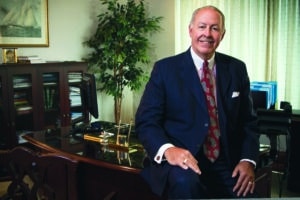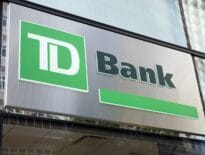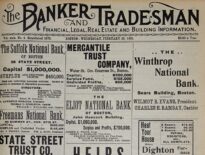James Blake
CEO, HarborOne Bank
Age: 71
Industry experience: 50 years
James Blake spent the first half of his career working at a series of banks that ended up being acquired, including Chelsea-based Atlantic Savings Bank, where he started his career; Provident Institution for Savings; Consumers Bank; and Mechanics Bank in Worcester. Once he ended up at Brockton Credit Union – which would later become HarborOne Credit Union and then HarborOne Bank – Blake would remain there for 29 years.
Blake decided early on in his career that he wanted to become a bank president, and he credits mentors for guiding him through the industry, including Henry Alpers at Atlantic Savings Bank and Tom Zocco at Provident Institution for Savings. During his time at HarborOne, Blake led the bank through a name change, a conversion from a credit union, a two-step conversion to a stock bank, acquisitions of a mortgage company and a bank and an expansion into Greater Boston. Blake plans to retire on his 72nd birthday in May, and the avid fisherman has planned a trip in June to go pike fishing in northern Canada.
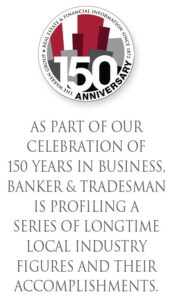 Q: How did you end up at Brockton Credit Union?
Q: How did you end up at Brockton Credit Union?
A: A search firm that had called me over the years called because Brockton Credit Union was looking for a CEO. I didn’t know what a credit union was. The company told me about them, and I went to the commissioner of banks’ office and talked with them about Brockton Credit Union and then looked at their financials. When I looked at it, I said, “This looks like a mutual savings bank, and they don’t pay taxes.”
Brockton Credit Union at the time was the largest community credit union in the country. I was hired as the chief operating officer, and the expectation was that if things worked out, the CEO was going to retire and I’d take over. Most of the people that were CEOs of credit unions grew in the credit union industry, and so their view of the industry was guided specifically toward credit union structure and financial capability. I’m not saying anything bad there – I’m saying it’s good. That wasn’t my focus. I looked at the organization as a financial institution, and we had a credit union charter. The more I got into it, the more I liked it because we were doing really good things, and it was consistent with the history of what credit unions were about at the time.
Q: What led you to convert to a bank?
A: My position had always been that as a credit union, the charter worked for us. As long as the credit union charter worked, we would continue to be a credit union. But if the charter got in the way of the success of the company, then the organization should consider what other options were available.
That was unusual in the sense that credit unions didn’t want to hear comments like that. But the industry changed, and the economy changed. Then we started moving toward the Great Recession, and from my standpoint, that was the real issue for us. We didn’t have much in the way of foreclosures during that period. What was obvious, as I pointed out to the board, is that we are the only financial institution in the country that has no ability to raise capital.
“We’ve just gone through a Great Recession where it hasn’t impaired us in capital,” I said, “and if this is what we’re dealing with, what do you think the next recession is going to look like? As a board, are we in a position to risk the future of the institution because of the charter, as opposed to having the capability to raise capital if needed?”
And we then talked about all the other issues that, from a product standpoint, we couldn’t get into. We couldn’t do business in Boston; we couldn’t do mortgages over $225,000; and we wanted to get into the indirect auto lending business.
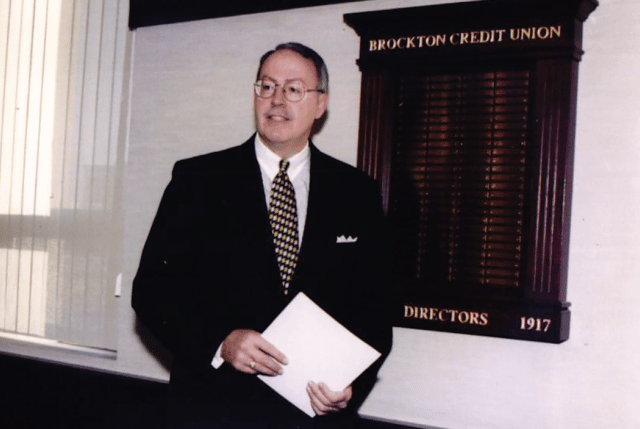
HarborOne CEO James Blake was photographed at the offices of what was then Brockton Credit Union in November 2000. Photo courtesy of HarborOne Bank
Q: What was the process like?
A: It was a difficult decision to make because we knew that the entire industry was going to attack us. And they did. There were only 35 credit unions that had ever converted to banks. We were the largest credit union to convert to a bank. Additionally, we were the largest community credit union in the country, and we had received numerous national accolades and trophies about what we do in the community. We had the [National Credit Union Administration] that was absolutely opposed to us becoming a bank. The NCUA changed their policies as to how a credit union can become a bank, and we were required to send three proxy documents to all of our depositors that said that there’s really no reason for the credit union to convert to a bank. We had our membership vote in Randolph at Lantana, and we had staff and police prepared in case there were protests. We had one of the largest in-person votes that had taken place in a conversion, and 96 percent of the customers said “yes” to convert to a bank. So, needless to say, it worked well for us.
Q: When you converted to a bank, did you plan on going public as well?
A: No. When we became a bank in July 2013, we had a couple of things we wanted to do. We wanted to have the ability to go into Boston, and we wanted to buy a mortgage company. It worked for us until we began to get to a point where we needed capital for the growth that we were looking at in the future.
Q: Is HarborOne different from what you envisioned in 2013?
A: We’re totally different because I never had a vision of us being where we are, in terms of the business we’re in and the size that we’re at. This is a tough business, and I say that because the regulatory requirements and competitive environments and credit cycles that you go through – you do the best you can, and you still get bit. We’ve never had a regulatory issue of any kind. We’ve never had a quarter in our history of losing money. Most of the years when we’ve had CRA ratings, they’ve been outstanding. I just wanted to grow the bank and certainly had no vision of anything like this at all.




